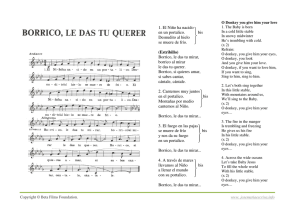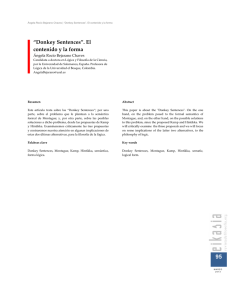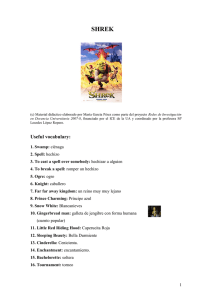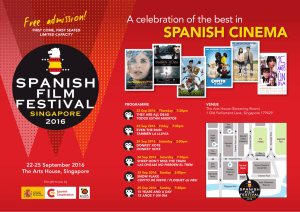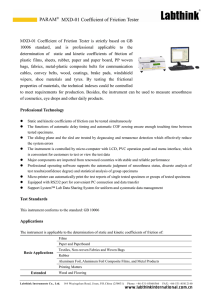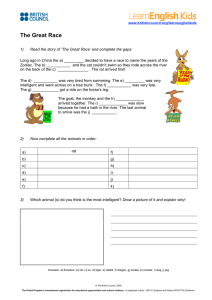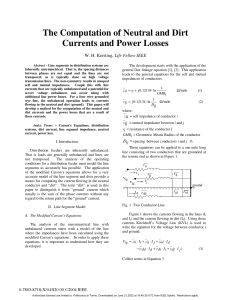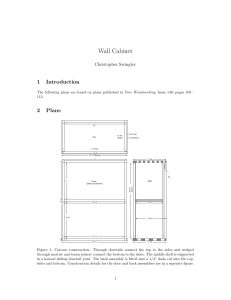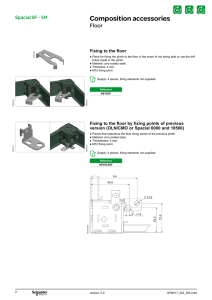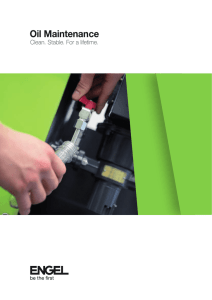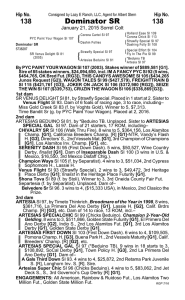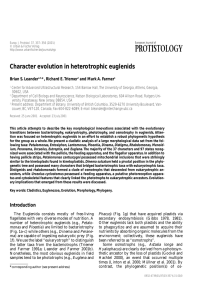Heartland Perhaps our next prophet will be a woman— She`s on the
Anuncio
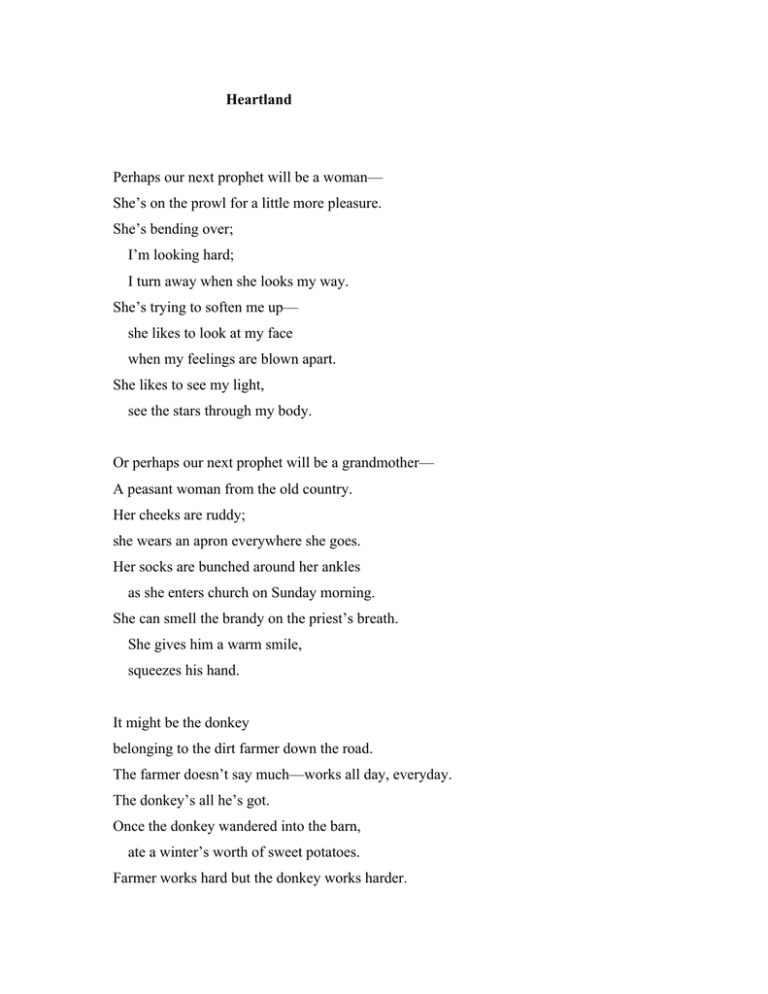
Heartland Perhaps our next prophet will be a woman— She’s on the prowl for a little more pleasure. She’s bending over; I’m looking hard; I turn away when she looks my way. She’s trying to soften me up— she likes to look at my face when my feelings are blown apart. She likes to see my light, see the stars through my body. Or perhaps our next prophet will be a grandmother— A peasant woman from the old country. Her cheeks are ruddy; she wears an apron everywhere she goes. Her socks are bunched around her ankles as she enters church on Sunday morning. She can smell the brandy on the priest’s breath. She gives him a warm smile, squeezes his hand. It might be the donkey belonging to the dirt farmer down the road. The farmer doesn’t say much—works all day, everyday. The donkey’s all he’s got. Once the donkey wandered into the barn, ate a winter’s worth of sweet potatoes. Farmer works hard but the donkey works harder. Potatoes were grimy; the donkey never noticed. Perhaps it’s the field out back: everyday dirt, a well worn coin, date rubbed off;. A coin doing the hard work of circulation. Tthe sacred more of a process than a feeling. Pa tried to grow squash in that field but the land was too elevated—in spring and summer too much direct sun. Just a piece of prairie now: baby buttercups shining in springtime. Eyes of a child will wick up that joy, for the world is filled with longing like an invisible tide. There’s a piece of me in everyone; a piece of everyone in me. I grew up poor and I grew up open. I am made from earth below and sky above. I am the springtime grasses green with hope. My blood is the rain, my eyes the stars, my words the murmurings of the earth. Mom was an orphan, Daddy a sharecropper he taught me to plow my furrows straight. Old woman lives a few miles up the road— up on the reservation. She doesn’t say much, but when she does she sure gets your attention. Face lined and leathery; turquoise jewelry and comb of bone, when her gaze lands on you it’s like she’s reading the stories folded into the petals of your heart. Lives in a trailer with her cats and her dogs, clips coupons, occasional cigarette, watches TV some. I visited her when Pa was sick. She gave me a turquoise ring. I kept it hidden in my coin pocket. She didn’t say much, just handed it to me when I got up to leave. I don’t think she did that too often. I don’t think she gave much away. You can feel it when you’re at the center because there’s only one center. Feel the bite of a late fall morning— poplars lining the creek are a radiant gold. Pa made me a toy wagon from scrap he collected. I can’t remember where he found the wheels. Come springtime, we filled the wagon with seeds. he dragged the wagon out to the fields, my hand curled up in his. We’re all seeds anyway— most of the seeds scattered by the wind but some of them take root. Sometimes I think the land is in prayer. Dirt farmer working the land as best he can and the land repays with the poverty of beauty. Hands are dirty but the fingers are slim, silence of the land an invisible chalice. Perhaps dreams need a period of dormancy like topsoil requires a fallow period. Perhaps dreams need a melding with heartbreak and loss— a time of darkness and compression in the depths of the earth so new life can emerge. Pa died too young; his name quickly forgotten but I remember the details of his life. He harvested what he could, his gestures a quiet praising. He got sick during the first drought, heartland turned to dust, hot winds stripped the topsoil away. First a cough, then a trembling fever. He was released from his burdens pretty quick. I didn’t get along with Mom’s new man. I was still a child when I left for good. The air warm, moon full that night I tiptoed out the door and headed south. I found work on a trawler. They never asked for my papers. I spent my free time in the French Quarter. She stood in a doorway dressed in red; she caught my eye as I passed by. We went to a bar, had some drinks. I found I could talk to her as she talked to me. We went upstairs, but I don’t remember a thing. I woke up next morning in the corner of a room. She was gone, but she left me some apples and a bird carved from wood painted blue, underbelly painted white. I joined a traveling circus— cleaned cages, fed the animals. I wanted to be a tightrope walker but others could see I was suited for clowning. The circus performed along the Gulf Coast in winter; come summer we headed north. My heart is made from stuff simple and plain, just the dirt and golden grasses of the prairie. Beauty of the world a wounding I don’t think I’ll ever recover from. Sometimes you have to go back to the past before you can step into the future. You move to heal your parents wounds so you can begin to live with your own. One night I slipped away; it was as if the horse knew where to take me. I went to the reservation first— her trailer still at the top of the hill. One of her dogs came to me, licked my hand. Her door unlocked, but she was gone--returned to the earth, returned to the sky. I headed down the road familiar panic leaking into my body when the poplars along the creek came into view. Just a two-room shack with a sod roof sagging filled with tumbleweeds, broken soda bottles and grit. I felt the heat of the sun touching my skin the air didn’t move— there was too much silence. I found the donkey’s bridle in the barn but I couldn’t find what I was looking for. A few yellow Kodachrome’s littered about: pictures of people I didn’t know, a couple of Mom which I kept. I spent the night in the old sleeping room restless the whole time; I left at first light. I rode north into Montana through fields of blue grass extending out to the horizon in every direction. I rode for days through the heat of summer. Cresting a rise, I came to the Missouri river. I spent the summer in a hobo camp on the banks of the river, with men on the loose— men looking for some sort of life. Early one morning, I was checking the fish traps pinks and yellows of dawn wicking through my senses, reconfiguring my inner world. I noticed it suddenly; half buried in the muck and brush of the shoreline, like a nugget of gold mixed in with the ordinary. A flexi-flyer sled; I wondered why I hadn’t noticed it before. Probably belonged to a boy living on a homestead farm upstream. Perhaps a springtime flood had washed his farm away. I cleaned the sled as best I could with river water; used a sock to rub it dry. One of the slats had been repaired— piece of 1x2, looked like barnwood, cut and fitted, fixed to the rails with a couple of square-headed nails. That boy was poor, yet somebody cared for him and I thought of Pa, the plug at the bottom of my heart loosened and grief welled up. Seemed like it was never gonna stop. For me the cloth of life is woven from the threads of caring. In the end, life gets washed away yet the caring remains. Pa had nothing; not even the dirt that he farmed. He was nothing in this world, yet his heart still here somehow, knitted into the mercy that supports this land. I spent the day fashioning a primitive crib in the space between the rails of the flexi flyer. I used twigs and bits of worn shirts that the men had discarded. I weighted the sled so it could float upside down. When shadows lengthened into twilight, I placed the turquoise ring and the blue-colored bird in the crib between the rails; floated the sled on the river, watched as it drifted to the horizon then disappear forever. I spent all night curled up on the bank of the river. I didn’t move a muscle, devoured by my dreams. Morning came and I rode south memory of a woman etched in my mind like gold script bordered by rubies. I looked high and low, but I couldn’t find her. But I found work in a hardware store. I’m saving my money soon I will buy some land.
